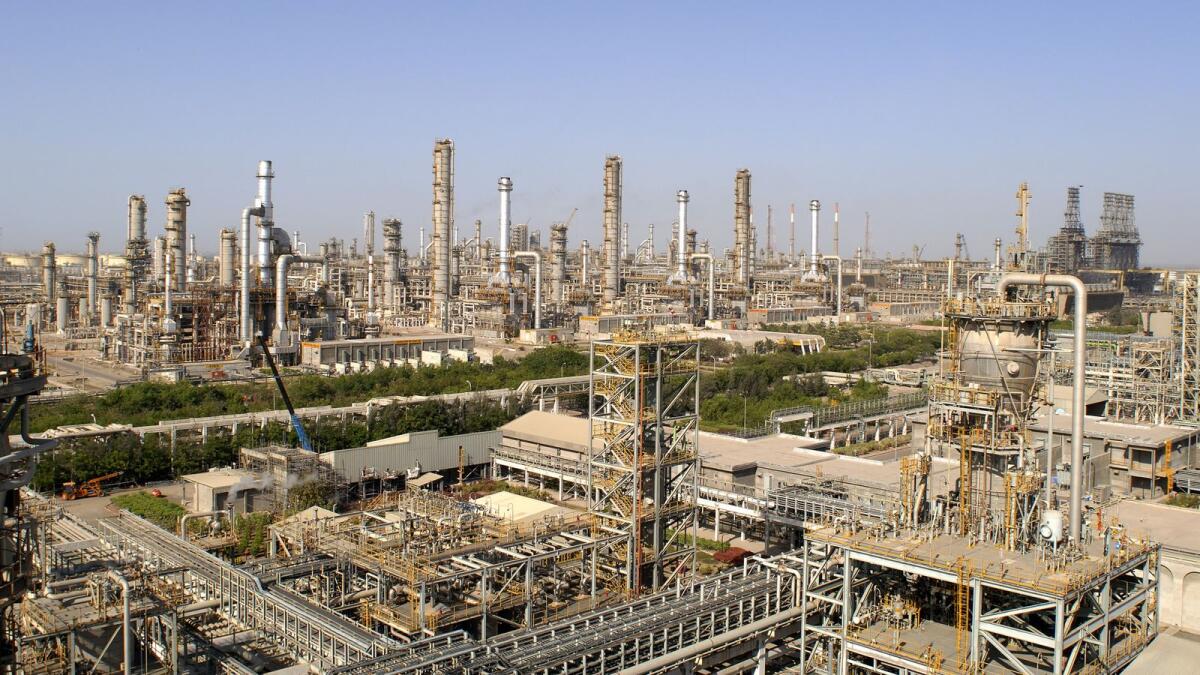Russia-Ukraine conflict impacts India growth
India’s growth to face turbulence as sanctions on Russia wreak havoc on global trade
- By
- Issac John

A general view of a refinery at Jamnagar, some 400kms west of Ahmedabad. Fuel, cooking gas, sunflower oil, automobiles, petroleum products, gold, precious stones and metals, coal and fertilisers are set to become expensive in days to come. — AFP file photo
As sanctions on Russia start to wreak havoc on global trade, the escalating war is having wider negative ramifications on India’s exports while a spike in oil prices will cause ripple effects on input prices and consumer goods leading to inflationary pressures in Asia’s third largest economy.
Against this backdrop, GlobalData, a London-based data analytics and consulting company, has lowered India’s economic growth forecast to 7.8 per cent for 2022.
India’s GDP was projected to grow 8-8.5 per cent in the 2022-23 fiscal year, according to the Economic Survey presented on January 31 ahead of the government’s budget for the fiscal year beginning April 1, 2022.
“In the short-term, Indian traders may feel the pinch of higher oil and gas prices along with delays in shipment and movement of assignments across Black Sea. Inflation rate is already on the rise due to increase in prices of fuel and edible oils. GlobalData forecasts the ongoing geopolitical risks arising from the Russia-Ukraine war to further push the inflation rate to 5.5 per cent in 2022 compared to 5.1 per cent in 2021,” said Gargi Rao, economic research analyst at GlobalData.
Hundreds of tankers and bulk carriers have been diverted away from the Black Sea since the break out of the war while dozens more have been stranded at ports and at sea unable to unload their valuable cargoes. Only a small handful of Russia’s 2,000 cargo and tanker ships have been sanctioned by Western powers, but freezing the assets of the country’s biggest banks means the business of importing and exporting from Russia will take a major hit. Intensifying
“Rise in commodity prices will add to the current account deficit, tighten financial conditions and lead to a possible depreciation of rupee against the US dollar. Investment climate might deteriorate. Shock to stock markets will further lead to decline in capital inflows.”
“There are upside risks to domestic inflation arising out of international commodity prices amid the ongoing conflict. Indian importers might feel the pinch of higher commodity prices and exporters may fail to reap benefits due to high logistics costs,” said Rao.
Fuel, cooking gas, sunflower oil, automobiles, petroleum products, gold, precious stones and metals, coal and fertilisers are set to become expensive in days to come.
Defence, tea exports, steel, coal, pharmaceuticals, fertilizer, oil, and gas sectors are likely to face maximum adverse impact, according to K Ravichandran, chief rating officer of Investment Information and Credit Rating Agency.
Analysts pointed out that for the Indian economy, which imports around 80 per cent of its requirements, higher crude oil prices will have adverse consequences. Crude oil prices hovered around $120 a barrel for the first time in years last Thursday. Crude prices, significantly higher than those factored in the budget and the Reserve Bank of India’s calculations will undermine growth, will be inflationary, and will exert upward pressure on the current account and fiscal deficit.
Ukraine and Russia together accounted for 2.2 per cent share of total imports of India in 2020. India mainly imports mineral fuels, natural pearls & semi-precious stones, fertilizers, petroleum oils & crude from Russia and animal or vegetable fat and oils, fertilizers, and inorganic chemicals from Ukraine. The prices of these items are projected to shoot up in the short-term.
However, on the positive side, with higher economic sanctions on Russia from the West, India can reap benefits from possible new export opportunities, analysts said. Steel and aluminium manufacturers could gain by tapping the EU market. The overall Indian banking sector will likely remain resilient. However, there might be a possibility of monetary tightening amid the inflationary pressures.
— issacjohn@khaleejtimes.com






